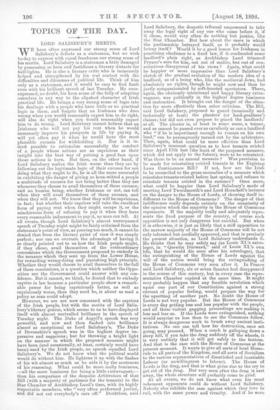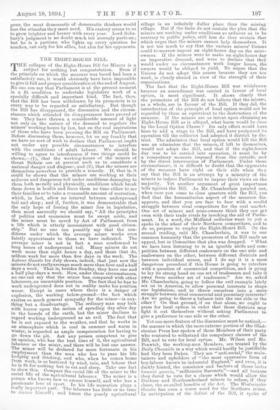TOPICS OF THE DAY.
LORD SALISBURY'S MERITS.
WE have often expressed our strong sense of Lord Salisbury's defects as a statesman, but we wish to-day to express with equal frankness our strong sense of his merits. Lord Salisbury is a statesman a little damaged by possessing so keen and fastidious a literary distaste for half-lights. He is also a literary critic who is immensely helped and strengthened by his real contact with the difficulties and dilemmas of political life. Think of him only as a statesman, and it would be easy to find fault even with his brilliant speech of last Tuesday. He over- expressed, no doubt, his keen sense of the folly of adapting ourselves in any way to the slipshod character of Irish practical life. He brings a very strong sense of logic into his dealings with a people who have little or no practical logic in them, and forgets that an Irishman who does wrong when you would reasonably expect him to do right, will also do right when you would reasonably expect him to do wrong. Lord Salisbury cannot believe that an Irishman who will not pay his rent when he would immensely improve his prospects in life by paying it, will yet often pay it when he would have the most plausible excuses for withholding it. Nor is it in- deed possible to rationalise successfully the conduct of a people whose actions are as capricious as their insight into the best way of putting a good face upon those actions is keen. But then, on the other hand, if Lord Salisbury makes the Irish worse than they are by following out the legitimate logic of their excuses for not doing what they ought to do, he is all the more successful in exhibiting the danger of giving so keen-witted a people a multitude of excuses for not being better than they are whenever they choose to avail themselves of these excuses; and no human being, whether Irishman or not, can tell when they will avail themselves of these excuses, and when they will not. We know that they will be capricious, in fact; but whether their caprices will take the excellent form of paying rent when they might escape it, or the mischievous form of refusing to pay it when they have every reasonable inducement to pay it, no man can tell. At all events, though Lord Salisbury's almost unsurpassed speech of Tuesday night might be fairly criticised from the statesman's point of view, as proving too much, it cannot be denied that from the literary point of view it was simply perfect ; nor can we overrate the advantage of having it so clearly pointed out to us how the Irish people might, if they chose, avail themselves of the extraordinary concessions which the Government proposed to embody in the measure which they sent up from the Lower House, for rewarding wrong-doing and punishing high principle. Whether they would choose to avail themselves to the full of these concessions, is a question which neither the Oppo- sition nor the Government could answer with any con- fidence. But it cannot, we think, be denied that to embody caprice in law because a particular people show a remark- able power for being capriciously better, as well as capriciously worse, than they need be, is about as mad a policy as man could adopt. However, we are not now concerned with the caprices of the Irish people, but with the merits of Lord Salis- bury's literary genius, which seems to us to have displayed itself with almost unrivalled brilliancy in the speech of Tuesday night. The Duke of Argyll's speech was very powerful, and now and then flashed into brilliance almost as exceptional as Lord Salisbury's. The Duke of Devonshire's speech was in the highest degree im- pressive and sagacious ; but for throwing a bright light on the manner in which the proposed measure might have been (and occasionally, at least, certainly would have been) used by the Irish people, no speech equalled Lord Salisbury's. We do not know what the political world would do without him. He lightens it up with the flashes of his wit almost as much as he aids it by the acuteness of his reasoning. What could be more really luminous, —all the more luminous for being a little extravagant,— than his comparison of the despotic Arbitrators of that Bill (with a majority of partisans for the tenants) to the Star Chamber of Archbishop Laud's time, with its highly respectable members, who "very often performed justice, and did not cut everybody's ears off." Doubtless, said Lord Salisbury, the despotic tribunal empowered to take away the legal right of any one who came before it, if it chose, would very often do nothing but justice, like the Star Chamber. But how about the cases in which the partisanship betrayed itself, as it probably would betray itself Would it be a good lesson for Irishmen in practising obedience to a fixed law, if it confiscated some landlord's plain right, as Archbishop Laud trimmed Prynne's ears for him, not out of malice, but out of con- scientious disapproval of his views ? Again, what could be happier or more impressive than Lord Salisbury's sketch of the gradual evolution of the modern idea of a landlord, as of a being who, like the mediaeval Jews, had absolutely no rights, though he might now and then be justly compassionated by soft-hearted spectators. There, again, the obviously intentional and happy literary extra- vagance, was politically in the highest degree luminous and instructive. It brought out the danger of the situa- tion far more effectively than sober criticism. The Bill, said Lord Salisbury, proposed to guard (nominally and technically at least) the planters' (or land.-grabbers') claims ; but did not even propose to guard the landlords' at all. The planter is, at least in some sense, a tenant, and so cannot be passed over as cavalierly as can a landlord who " if he is impertinent enough to remain on his own land," can be peremptorily turned out by the arbitrators. Then, again, what could be more effective than Lord Salisbury's innocent question as to how tenants evicted since April 17th last (the limit of the proposed measure, which did not apply to the future), were to be reinstated. Was there to be an annual measure ? Was provision to be made for reinstating evicted tenants in the Expiring Laws Continuance Bill ? If not, how are the Irish to be reconciled to the gross anomalies of a measure which reinstates tenants evicted before last spring, and refuses to reinstate tenants evicted in the summer? Once more, what could be happier than Lord Salisbury's mode of meeting Lord Tweedmouth's and Lord Herschell's lectures on the danger to the House of Lords, of showing itself in- different to the House of Commons ? The danger of that indifference really depends entirely on the unanimity of the opinion which the majority in the House of Commons represents. If the majority really and adequately repre- sents the fixed purpose of the country, of course such opposition is not only dangerous but suicidal. But when it is otherwise, it is just as likely that a stiff opposition to- the narrow majority of the House of Commons will be not, only tolerated but cordially approved, and that is precisely the present situation, as Lord Salisbury understands it. He thinks that he may safely say (as Louis XI.'s astro- loger, in " Quentin Durward," said of Louis XI.'s own life, that he would die soon after his astrologer), that the extinguishing of the House of Lords against the will of the nation would bring the extinguishing of the House of Commons very soon after it. In France said Lord Salisbury, six or seven Senates had disappeared in the course of this century, but in every case the repre- sentative Chamber expired at the same time. It might very probably happen that any forcible revolution which upset one part of our Constitution against a strong current of popular feeling, would prepare the way for the upsetting of another part. No doubt the House of Lords is not very popular. But the House of Commons is every day getting less and less popular with the people, and all these violent gagging proceedings are making it less and less so. If the Lords were extinguished, nothing would surprise us less than to see the Commons follow. It is always dangerous work to brush away ancient insti- tutions. No one can tell how far destruction, once set. going, may proceed. When a coach is galloping down a steep hill, if you take the drag suddenly off the wheels, it is very unlikely that it will get safely to the bottom. And that is the case with the House of Commons at the present moment. It wants to give all sorts of local Home- rule to all parts of the Kingdom, and all sorts of Socialism. to the various representatives of dissatisfied and insatiable. Labour (or unwillingness to labour). The House of Lords is the drag, and that is what gives rise to the cry to get rid of the drag. But very soon after the drag is cast away, the whole structure will probably come to grief. At all events, we do not know what even his most vehement opponents could do without Lord Salisbury. Nobody else exhibits the case against which they love to rail, with the same power and vivacity. And if lie were gone, the most democratic of democratic thinkers would lose the stimulus they most need. His oratory seems to us to grow brighter and keener with every year. Lord Salis- bury's judgment is no doubt much too strongly partisan; but he is a partisan who lights up every question he touches, not only for his allies, but also for his opponents.



































 Previous page
Previous page